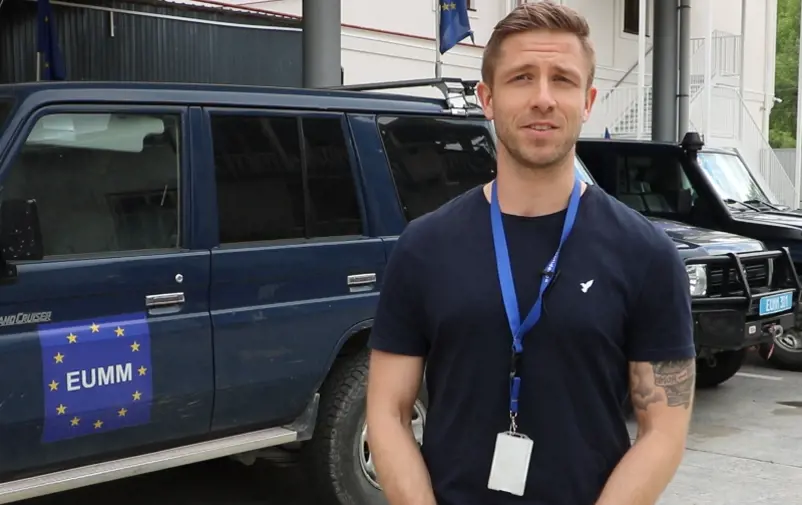
Tobias Priadi-Sörensen is one of several Swedes seconded by FBA to the European Union Monitoring Mission in Georgia.
Thousands of civilians have lost their lives and millions of people are displaced inside and outside Ukraine's borders due to Russia's illegal and unprovoked invasion war. Attacks against the civilian population and critical infrastructure persists, and the UN reports serious human rights violations and systematic war crimes.
– Despite tremendous trials, human suffering and extensive destruction, Ukraine has shown great resilience at national and local level. They have made remarkable progress in their reform efforts aimed at EU membership, but the needs are still enormous, says Johanna.
Together with Sida and the Swedish Institute, FBA is tasked by the government to implement Sweden's strategy for recovery and reform cooperation with Ukraine for the years 2023-2027.
– Through our efforts, we will contribute to Ukraine's EU integration, which is an important part of creating long-term conditions for peace and security in Ukraine, says Johanna.
Johanna emphasises the importance of continued strong international support and the European Commission's new €50 billion financial instrument aimed at strengthening the Ukrainian government in the long term. The support is intended for the implementation of Ukraine's national plan focusing on recovery, reconstruction, modernisation and necessary reforms for the EU accession process.
– The discussion on reconstruction may seem premature given that a full-scale war is ongoing and the urgent needs are still great. However, life continues even under war conditions, and plans for the future cannot be put on hold, says Johanna.
She points out that there is a strong emphasis on infrastructure in the reconstruction and development plans. At the same time, it is important not to forget the people; they need economic, social and psychological conditions to rebuild themselves and their society.
– To strengthen the capacity of individuals and society to withstand and recover from the enormous stresses of war, the FBA has a focus on human capital. Reconstruction efforts in Ukraine need to both counteract destabilisation by addressing current and short-term needs – and at the same time lay the foundation for stronger resilience and social cohesion in the longer term.
International support needs to promote social cohesion, human security, human rights and gender equality in an integrated and inclusive way, according to Johanna. She highlights Ukraine's many diversified groups, such as veterans, Internally Displaced Persons (IDPs) and returnees, where men, women, boys and girls from different backgrounds and geographical areas face various challenges.
– Social tensions both between and within these groups, such as veterans feeling alienated and misunderstood by civilians, can fuel local tensions, playing into the hands of the aggressor.
– To counteract Russia's destabilisation attempts, it is therefore important that discussions and plans for Ukraine's reconstruction include the perspectives and needs of different groups and regions in society, says Johanna.
It is not only about promoting trust and cohesion between different groups of people, but also between the state and the individual, emphasises Johanna.
– At the FBA, we have an initial focus on newly liberated and adjacent territories, where Ukraine faces an urgent challenge to re-establish basic security and public services. This involves, for example, establishing dialogue between police and residents to address the security needs of women and men.
She highlights that FBA has added value as an actor with the ability to connect decision-makers and citizens, and extensive experience in working with security actors from a gender and human security perspective.
– The FBA also has expertise in dialogue, mediation and social cohesion, which Ukrainian security sector actors operating in liberated and neighbouring areas are requesting, adds Johanna.
– Ukrainian ownership of reconstruction and reform efforts is crucial. To ensure that our efforts are well adapted to Ukraine's needs and priorities, it is important that Sweden and FBA continue to work in close cooperation with Ukrainian state and civil society actors, says Johanna.
To better manage the rapidly changing situation, the agency is strengthening its local presence, for example through staff at the Swedish Embassy in Kiev and through seconded staff to international organisations. The FBA also works in close cooperation with other Swedish, European and international actors to effectively contribute where it is most needed.
– It is important that we remain united in strong support for Ukraine, not only to safeguard the country's territorial integrity and the rights and freedoms of its people, but also to restore a world order based on international law, concludes Johanna.
MORE FROM HOME
Since 2008, the European Union Monitoring Mission EUMM has been a constant presence in Georgia. With the mandate to monitor the ceasefire and prevent the conflict between Georgia and Russia from reigniting, the mission works to promote stability and security – and to help ensure a safer daily life for the people affected.
2025-08-26 12:45FBA has both increased and adapted its work in Ukraine in the wake of Russia's invasion.
FBA in UkraineKlara Grenhagen works as a specialist at FBA's Africa unit with a focus on dialogue, reconciliation and peace processes.
More about our expertsFBA is part of Sweden’s development aid within the area of peace and security
Read more about the countries where we work